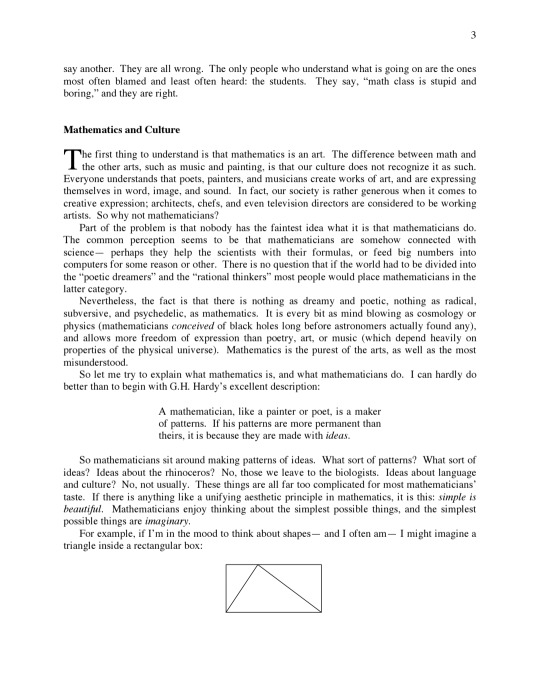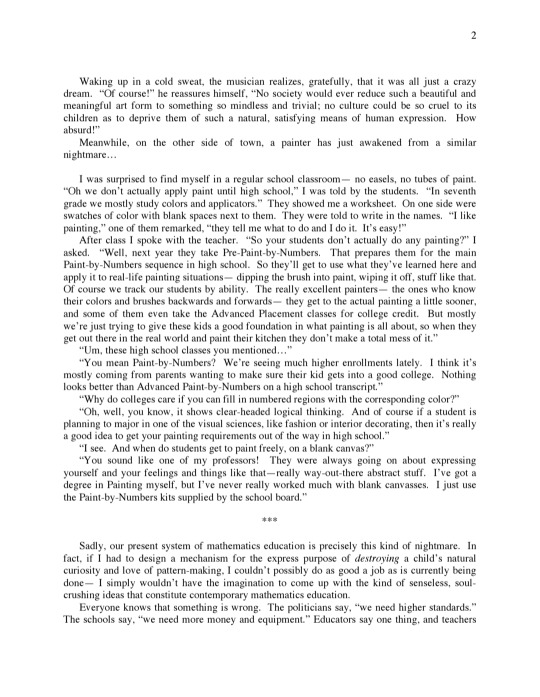#a mathematicians lament
Explore tagged Tumblr posts
Text

<Essays3
Guess who didn’t have any homework today :D! That means I finally started reading a new essay: A Mathematician‘s Lament by Paul Lockhart. I’m on page 9 and loving it so far! I guess I’m loosing my hate for math after all; the essay is giving me a new perspective on math - one that makes me curious to find out more about mathematics outside of the educational system.
Todays highlight: A very kind someone offered to write me a list of new therapists I could contact (very unexpected but made my day!!)
#finn is studying#high school#studyblr#high school students#high school studyblr#high school senior#studying#studyspo#study aesthetic#do your homework#i have homework to do#studying inspiration#study notes#study#study motivation#study inspiration#study blog#art study#a mathematicians lament#math homework#math#math class#mathblr#mathematics#math art#academia aesthetic#essay#essayposting#classic academia#dark academia
141 notes
·
View notes
Text



0 notes
Text
“Mathematics is the music of reason. To do mathematics is to engage in an act of discovery and conjecture, intuition and inspiration; to be in a state of confusion— not because it makes no sense to you, but because you gave it sense and you still don’t understand what your creation is up to; to have a breakthrough idea; to be frustrated as an artist; to be awed and overwhelmed by an almost painful beauty; to be alive, damn it. Remove this from mathematics and you can have all the conferences you like; it won’t matter. Operate all you want, doctors: your patient is already dead.”
A Mathematician's Lament - Paul Lockhart
13 notes
·
View notes
Text
reading one of those books that promises to explain the beauty of math to laypeople :) (this one explains euler's formula). i am struck by the fact that every piece of writing (or video essay, or interview, etc) that endeavors to explain math to laypeople has to first linger on the topic of how schools teach math in a way that is guaranteed to kill all interest in the topic. paul lockhart was so right
24 notes
·
View notes
Text
#the mathematicians lament crossed my dash#and my tiny brain is getting excited about it#but I had the idea ten minutes ago#and fast and strong ideas are hit or miss
12 notes
·
View notes
Text
Hey look an opportunity to quote Paul Lockhart, I love it when that happens
"If you deny students the opportunity to engage in this activity—to pose their own problems, make their own conjectures and discoveries, to be wrong, to be creatively frustrated, to have an inspiration, and to cobble together their own explanations and proofs—you deny them mathematics itself."
cried in math today, nothing hard just got scared of being wrong. But being wrong is ok it means you have room to grow. So mathblr community remember you’re doing your best and you’re doing what you love. Math wants you to be wrong it’s a challenge to other future mathematicians
185 notes
·
View notes
Text
”girl math” “boy math” heh… you wouldn’t handle spending a second in my twisted mind… (dyscalculia)
0 notes
Text
rereading lockharts lament

1 note
·
View note
Text

Paul Lockhart’s A Mathematician’s Lament
#im obsessed#this is one of the best essays I’ve read in a while#maybe I’m just romanticising it#but#im starting to really like math#a mathematicians lament#mathblr#essay#studyblr#mathematics
9 notes
·
View notes
Text
In tags under my response to @algebraic-dumbass, @associativeglassdesert said:

(If you've not seen that post, go read it).
This is interesting to me, but does go some way towards explaining why people like Lockhart's Lament. I've definitely seen other people express similar sentiments. However, I don't really get it.
High school geometry is terrible because it's boring. Lockhart does get that right. It's terrible for exactly the same reason that high school history and high school English and high school drama are terrible. People don't care. So you can't ask them to do anything hard, and therefore anything interesting.
Mathematicians often have this viewpoint that if only we got people to do this or that kind of maths in high school, it would be "better". Now a lot of that has merit, don't get me wrong. I think more emphasis on proof would be good for society at large. But even a more proof-heavy high school algebra would suck. It would still be boring to most people, because most people aren't mathematicians. And that's ok!
I don't know how to solve that problem, especially not at 2am, but I think the answer that "high school geometry sucks because it's insufficiently creative" or "it's too far from university geometry" are just pushing the problem elsewhere. You're just making it boring for a different subset of people. The problem is with the concept of standardised curricula much more than any individual course anyone could design.
76 notes
·
View notes
Note
You seem to like Lockhart's Lament, and I really don't get it. Besides being (intentionally?) pretentious, I feel like it massively misrepresents what mathematicians actually do. We spend most of our time doing creative problem solving, working towards some fixed external goal. Not creative design, where the end goal is up to our own whims.
To take an example I've seen quoted, but fine particularly egregious: "A piece of mathematics is like a poem, and we can ask if it satisfies our aesthetic criteria: Is this argument sound? Does it make sense? Is it simple and elegant? Does it get me closer to the heart of the matter?" This is a massive false equivalence!! The first two are factual statements, either the argument is sound or not!! Yeah there's an element of communication which is more subjective, but comparing the soundness of an argument to its elegance completely lost my respect for him.
I mean, I like Lockhart's Lament because I find it explains very well what math actually is as opposed to what people who only did math without proofs (i.e. most people who quit math after highschool, in my experience) believe math is. Now I do agree with you that it is pretentious, and probably intentionally. Now, the full paragraph of what you quoted is
And I haven’t even mentioned the lack of mathematical criticism in school. At no time are students let in on the secret that mathematics, like any literature, is created by human beings for their own amusement; that works of mathematics are subject to critical appraisal; that one can have and develop mathematical taste. A piece of mathematics is like a poem, and we can ask if it satisfies our aesthetic criteria: Is this argument sound? Does it make sense? Is it simple and elegant? Does it get me closer to the heart of the matter? Of course there’s no criticism going on in school— there’s no art being done to criticize!
I think what Lockhart might be meaning here (or at least, that's how I interpreted it when I read it) is that students in school never get to experience what it is to "have an opinion" (broadly) about a piece of mathematics. I think that under the word "criticism", Lockhart lumps in "checking the soundness of an argument" and more subjective matters such as "is the argument elegant?". Both types of reflections on an argument are a part of a mathematician's work, though I do agree with you that putting soundness on the same level as elegance is misguided at best.
However, I don't think it's fair to throw away the whole thing because of one comparison. I believe this because I mostly see it as a convenient piece of writing to point to so people who have a highschool understanding of what math is can get a slightly better idea. Though it is rare for me these days, from what I remember from when I talked with non-math people about math is that they believe it is a set of predefined rules, and are often baffled you can even do research in it. For these people, Lockhart's Lament would be at least helpful. This is why I link it on my posts, obviously to anyone actually familiar to math it has little value, but I expect some non-math people to maybe stumble upon it.
As for the "misrepresentation" part, I don't know. I will concede I have not yet done actual research so maybe I still have a flawed understanding of how it happens. I will say I especially like the example of the triangle in the box as it (in my opinion) clearly demonstrates how (1) you do think about an abstract problem of your choice and (2) you solve it, not by pure creativity, but with some creativity and problem-solving involved. In fact Lockhart even says
On the other hand, once you have made your choices ([...]) then your new creations do what they do, whether you like it or not. This is the amazing thing about making imaginary patterns: they talk back! The triangle takes up a certain amount of its box, and I don’t have any control over what that amount is. There is a number out there, maybe it’s two-thirds, maybe it isn’t, but I don’t get to say what it is. I have to find out what it is.
This I think clearly underlines that mathematics is not creative design. The metaphor is useful to rid people of their preconcieved ideas of what math is and I believe that's why Lockhart uses it.
Again maybe I just have a very flawed understanding of what research is. What do i know. I'm just an algebraic-dumbass
(By all means if you have a better piece of writing I can reference to do the whole explaining-of-what-math-actually-is for me, do tell! I would be very happy to have other things to point to!)
48 notes
·
View notes
Text

I last read...
A Mathematician's Lament by Paul Lockhart
what I wanted: to engage more with Mathematics since I interact with mathematicians daily
what I got: a fun, quick read!
what I thought: This is short but really quite fun and a nice love letter to mathematics as a form of art and play. I rate it 3.5 out of 5 math tools.
26 notes
·
View notes
Text

Saint Gregory of Narek
Doctor of the Church
c.950 - c.1005
Feast Day: February 27 (Roman Rite) October 13 (Armenian Rite)
Saint Gregory of Narek, the son of an Armenian Bishop, was raised and lived most of his life in the Monastery of Narekavank in Turkey, teaching, and writing. Gregory was a priest/monk, poet, theologian, mathematician, and scientist. He wrote the Encyclopedia of Prayer for all Nations, that’s considered a classic in Armenian literature. The Book of Lamentations, his masterpiece, was completed just before he died at age 90. Today he’s known as “the Watchful Angel in Human Form” because of the many miracles started with prayer. Pope Francis proclaimed him a Doctor of the Church in 2015
Prints, plaques & holy cards available for purchase. (website)
22 notes
·
View notes
Text
max's february reads
fiction
finished rereading Station Eleven for class (review)
reread Hamlet for class (hence the recent insanities)
started rereading Baldwin's Go Tell it on the Mountain
started Eon by Alison Goodman
nonfiction
Paper Cuts: A Memoir by Stephen Bernard (review)
Split: A Child, a Priest, and the Catholic Church by Mary Dispenza (review)
specifically the Hamlet chapter of This is Shakespeare by Emma Smith
A Mathematician's Lament by Paul Lockhart (reread for kicks)
stuff i read in my trans studies class that blew my fucking mind
Evil Deceivers and Make-Believers by Talia Mae Bettcher (on the idea that trans people's gender expression and self-definition is inherently dishonest)
Is Transmisogyny Killing Trans Women of Color? by Elías Krell (on transmisogyny, white feminism, and Black trans women)
The Biopolitical Birth of Gender by Jemima Repo (on the formulation of 'gender' as a separate concept from sex, as constructed by sexologists in the 1950s abusing intersex children)
Heterosexualism and the Colonial / Modern Gender System by María Lugones (on the construction of heterosexuality and the binary gender system as a specifically white supremacist, colonialist structure)
The Future is Kid Stuff by Lee Edelman (gonna be so real half of this went over my head. but the observations on the rhetorical construction of The Child are really good)
chapters 1, 2, 4, and 5 of Black on Both Sides by C. Riley Snorton (on the violent use of Black lives to explore and construct gendered science, and on Black trans histories)
chapter 2 of Histories of the Transgender Child by Jules Gill-Peterson (what it sounds like; specifically in this chapter in the early 1900s, pre-WW2)
misc
Installation Piece by Latanya Queen
The First Lie by Robert Wood Lynn
i thought about putting movies on here but this month i watched both kenneth branagh's hamlet and the cgi mufasa movie so that's enough about that i think
14 notes
·
View notes
Text
任何形式的思考敏銳度都來自於自己解決問題,而不是來自於被告知如何解決問題。
Paul Lockhart, A Mathematician's Lament: How School Cheats Us Out of Our Most Fascinating and Imaginative Art Form
▪︎ A brilliant research mathematician who has devoted his career to teaching kids reveals math to be creative and beautiful and rejects standard anxiety-producing teaching methods. Witty and accessible, Paul Lockhart’s controversial approach will provoke spirited debate among educators and parents alike and it will alter the way we think about math forever.
▪︎ Paul Lockhart became interested in mathematics when he was 14 (outside the classroom, he points out). He dropped out of college after one semester to devote himself exclusively to math. Based on his own research he was admitted to Columbia, received a PhD, and has taught at major universities, including Brown University and UC Santa Cruz. Since 2000 he has dedicated himself to "subversively" teaching grade-school math at St. Ann's School in Brooklyn, New York.
Mental acuity of any kind comes from solving problems yourself, not from being told how to solve them.
Paul Lockhart, A Mathematician's Lament: How School Cheats Us Out of Our Most Fascinating and Imaginative Art Form
#paul lockhart#a mathematician's lament:#how school cheats us out of our most fascinating#and imaginative art form#👍#well said#💗
44 notes
·
View notes



